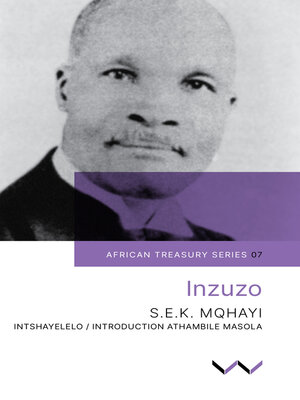
Sign up to save your library
With an OverDrive account, you can save your favorite libraries for at-a-glance information about availability. Find out more about OverDrive accounts.
Find this title in Libby, the library reading app by OverDrive.



Search for a digital library with this title
Title found at these libraries:
| Library Name | Distance |
|---|---|
| Loading... |
Inzuzo is a classic collection of poems, first published in 1943, about religion, nature, life and historical events and prominent figures in the history of Africans. It has five sections: Izabelo (Distributions), Izibongo ezingokufa nokuthwasa komnyaka (Poems about death and the beginning of the year), Izibongo ezingabafi bethu (Poems about the dead), Izibongo ngabawele iilwandle (Poems about people who have travelled overseas) and Ingqokelela (Collection). In each section, Mqhayi proved himself to be a literary author with the ability and skill to transform from a traditional poet to a modern poet. This ability is most evident in the first section, Izabelo, with poems composed in a manner that demonstrates western influence in their structure. Mqhayi was able to combine modern versification with the diction and artistic form of izibongo (praise poems). Mqhayi's poetry is also a storehouse of historical events as in poems like Umnyaka omtsha, 1915 (New Year, 1915), Aa! Zweliyazuza! (Hail Great Britain on whom the sun never sets!), and Umfikazi uCharlotte Manyhi Maxeke, a tribute to Charlotte Manyhi Maxeke. In these poems, his style as a praise poet is distinct. The poems portray Mqhayi as a religious and social poet. He took an interest in the welfare of his people and embraced African culture. Known as the father of isiXhosa contemporary and traditional poetry, Mqhayi was a well-known imbongi (praise poet) who was revered as Imbongi yeSizwe Jikelele (National Poet).|Inzuzo is a classic poetry collection from 1943 that comprises five sections: Izabelo (Distributions), Izibongo ezingokufa nokuthwasa komnyaka (Poems about death and the beginning of the year), Izibongo ezingabafi bethu (Poems about the dead), Izibongo ngabawele iilwandle (Poems about people who have travelled overseas) and Ingqokelela (Collection). In each section, Mqhayi proved himself to be a literary writer with the ability and skill to combine the style of a traditional poet with modern poetry. This ability is most evident in the first section called Izabelo with poems that are composed in a manner that demonstrate western influence in their structure. Mqhayi's poetry is also a storehouse of historical events as depicted in poems such Umnyaka omtsha, 1915 (New Year 1915), Aa! Zweliyazuza! (Hail Great Britain on whom the sun never sets!), and Umfikazi uCharlotte Manyhi Maxeke, a tribute to Charlotte Manyhi Maxeke. In these poems, his masterful style as a praise poet is distinct. The poems contained in the book portray Mqhayi as a religious poet, social poet, and poet of the people who took a keen interest in the welfare of his people and embraced African culture. Known as the father of isiXhosa contemporary and traditional poetry, Mqhayi was a well-known imbongi (praise poet) who was revered as Imbongi yeSizwe Jikelele (National Poet).







